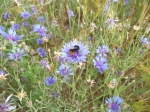Wild bees get boost from diverse, organic crops
14.03.2013 |
 A new research article “A global quantitative synthesis of local and landscape effects on wild bee pollinators in agroecosystems”, with lead authors Christina M. Kennedy, from the Urban Wildlife Institute, Lincoln Park Zoo, Chicago and Claire Kremen from the Department of Environmental Science, Policy and Management, University of California, Berkeley. The study mainly supported by UC Berkeley has also the involvement of several STEP members. A new research article “A global quantitative synthesis of local and landscape effects on wild bee pollinators in agroecosystems”, with lead authors Christina M. Kennedy, from the Urban Wildlife Institute, Lincoln Park Zoo, Chicago and Claire Kremen from the Department of Environmental Science, Policy and Management, University of California, Berkeley. The study mainly supported by UC Berkeley has also the involvement of several STEP members.
The study found that wild bees were more abundant in diversified farming systems. Unlike large-scale monoculture agriculture, which typically relies upon pesticides and synthetic fertilizers, diversified farming systems promote ecological interactions that lead to sustainable, productive agriculture. Such systems are characterized by high levels of crop and vegetative diversity in agricultural fields and across farming landscapes.
“The way we manage our farms and agricultural landscapes is important for ensuring production of pollinated-food crops, which provide about one-third of our calories and far higher proportions of critical micronutrients,” said study senior author Claire Kremen, professor at the University of California, Berkeley’s Department of Environmental Science, Policy and Management. “This result provides strong support for the importance of biologically diversified, organic farming systems in ensuring sustainable food systems.”
Many of the study’s authors, including Kremen, also co-authored a study published March 1 in Science that found that fruit and vegetable production increased when wild pollinators – as opposed to domesticated honeybees – were more abundant.
“That study showed that wild bees helped crop yield, and this study shows that organic crops in a diversified farming system help wild bees,” said Kremen.
Christina Kennedy, senior scientist at The Nature Conservancy, is the study’s lead author.
See Attached files here:
| | all news » |
« Back  Print view Print view
|
